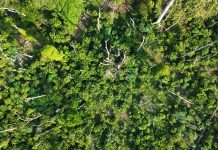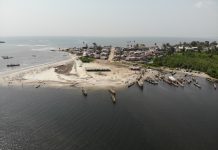Top: A Burkinabé man displays his immigration document at the FDA regional office in Zwedru, Grand Gedeh County. The DayLight/James Harding Giahyue
By Varney Kamara
GBOLEKEN, Grand Gedeh – The Liberia Immigration Service (LIS) reported that it has recorded over 40,000 Burkinabé cocoa farmers to monitor and legalize their status.
“It is intended to establish how many of them entered the country and where exactly they crossed,” Alex Kpakolo, Assistant Immigration Comptroller of Grand Gedeh County.
“We are taking stock of their movements and actions across the different towns, villages, districts, and communities where they are hosted. By doing this, we can easily trace them if there is a problem.”
Burkinabés began to enter Liberia from the Ivory Coast in the 2010s to plant cocoa. Last year, France 24 reported 25,000, capitalizing on Liberia’s weak monitoring, large rainforests, and higher cocoa prices. Ivory Coast has lost 90 percent of its forest to cocoa farming in the last six decades, according to that report. The same is happening in Liberia, which has lost 386,000 hectares of primary forests between 2002 and 2024, according to Global Forest Watch, which tracks annual deforestation.
Immigration records show over 1,000 Liberians host at least one Burkinabe farmer, known locally by their ethnic group, Mossi. They have settled mainly across Maryland, River Gee and Grand Gedeh.
In Grand Gedeh alone, the number of registered Burkinabes has exceeded 36,000. To ensure a smooth process, immigration authorities have established 18 registration sectors. “As a result of this process, most of the Burkinabes are now coming out of the bushes and registering. Their hosts, too, encourage them daily to come for the registration. That’s why you see we have this kind of high number,” Kpakolo said in an interview at his office in Gboleken, Gbarzon District.

After the registration, the Burkinabes would be vetted and issued resident permits, in line with the Alien and Nationality Law of Liberia. The law requires non-Liberians to obtain a permit to reside in Liberia. ECOWAS citizens pay US$100 for the permit, with a fine or deportation for violators.
“After registration, we will review their status and find out whether they are here only temporarily or if they want to stay and work here permanently. After this process, LIS will decide to start issuing resident permits,” Kpakolo said.
Rising tension
Labor authorities are watching the process. Robson Bah, Labour Commissioner of Grand Gedeh, said the ministry intended to formalize contracts between locals and their West African partners.
“We have noticed that people who don’t have titled deeds are cutting boundaries and giving out land to Burkinabés. And, as a result of this, you have confusion all over the place,” said Robson Bah, Labour Commissioner of Grand Gedeh.
“Today, everything appears to be going well between the Burkinabes and their Liberian hosts, but when money starts to come and things start to happen, they may not be peaceful.”
Across the southeastern region, cocoa farming is splitting families and communities, according to court records. The Zwedru City Magisterial Court has recorded at least 10 similar cases. Last week, 31 accused of illegally encroaching on concessions to plant cocoa were jailed at the Zwedru Correction Palace.
This was a Community of Forest and Environmental Journalists (CoFEJ) production.





Facebook Comments